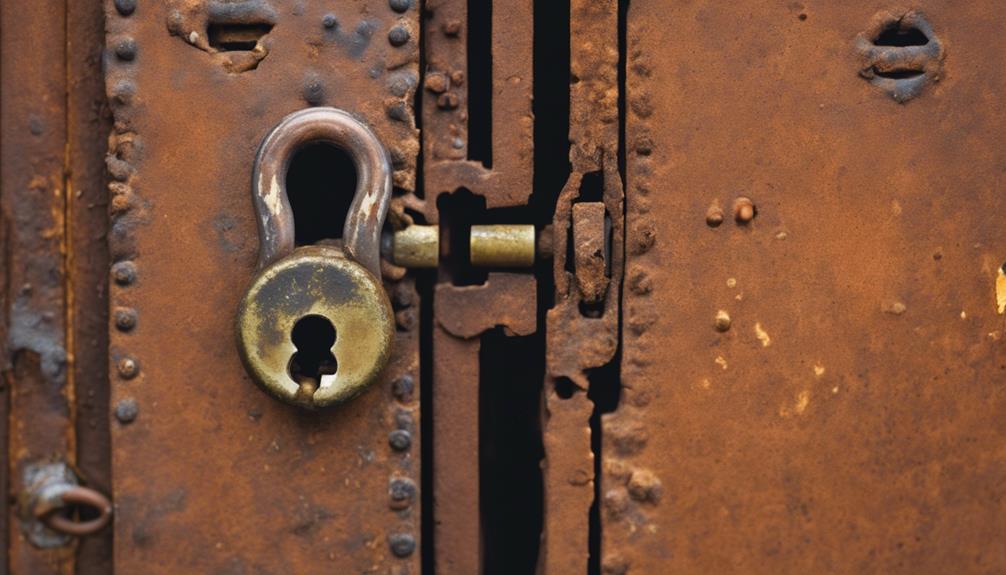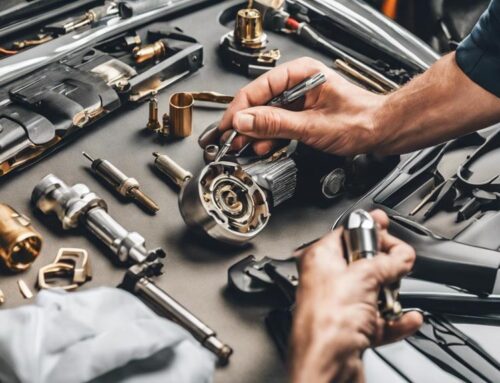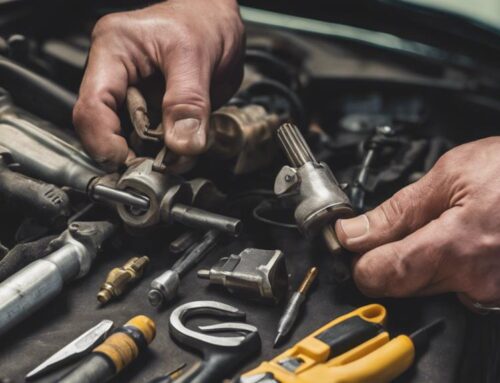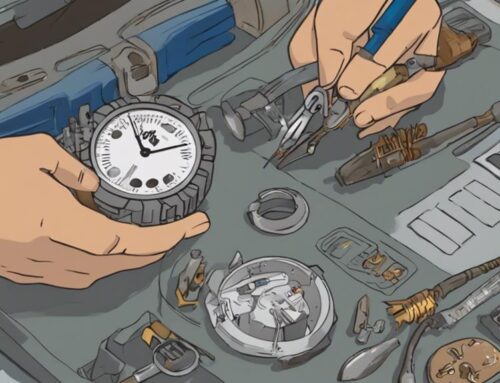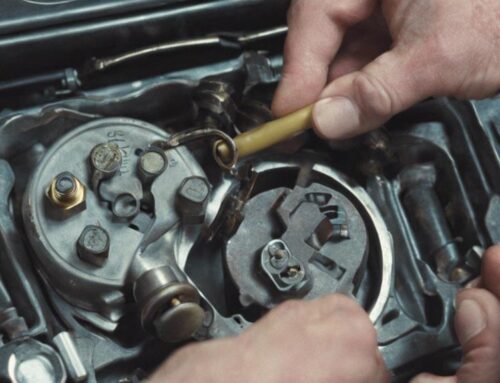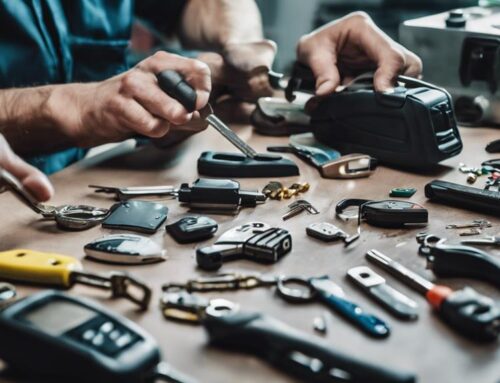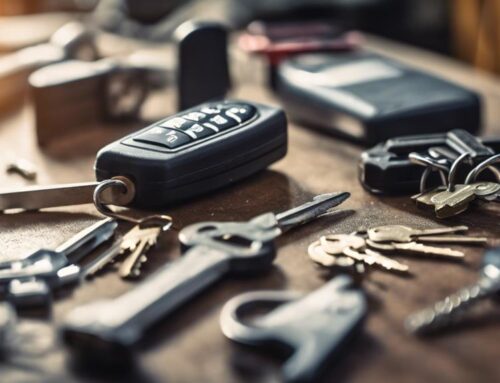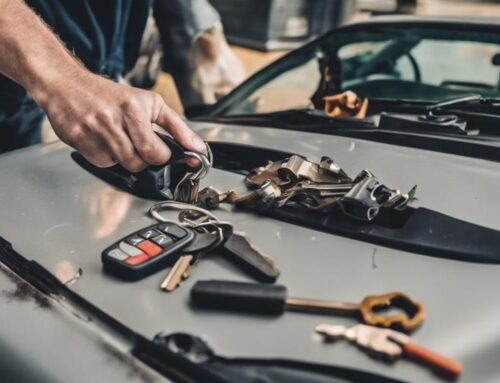To prevent future lock issues and understand why locks break, focus on key factors and take proactive measures. Regular wear and tear weakens locks over time, while investing in high-quality locks with advanced security features can prevent breakages. Lack of maintenance leads to rust and sticky locks – routine upkeep is essential. Weather plays a role too; cold weather can freeze locks, and high humidity causes rust. Key usage and improper installation can also cause problems. Remember, keys should only be used for their intended purpose to guarantee longevity. By addressing these factors, you can keep your locks secure and functional.
Key Takeaways
- Regular maintenance prevents wear and tear.
- Quality locks with durable materials prevent breakages.
- Advanced security features deter lock failures.
- Proper material selection reduces lock issues.
- Inspections catch potential problems early.
Common Causes of Lock Failures
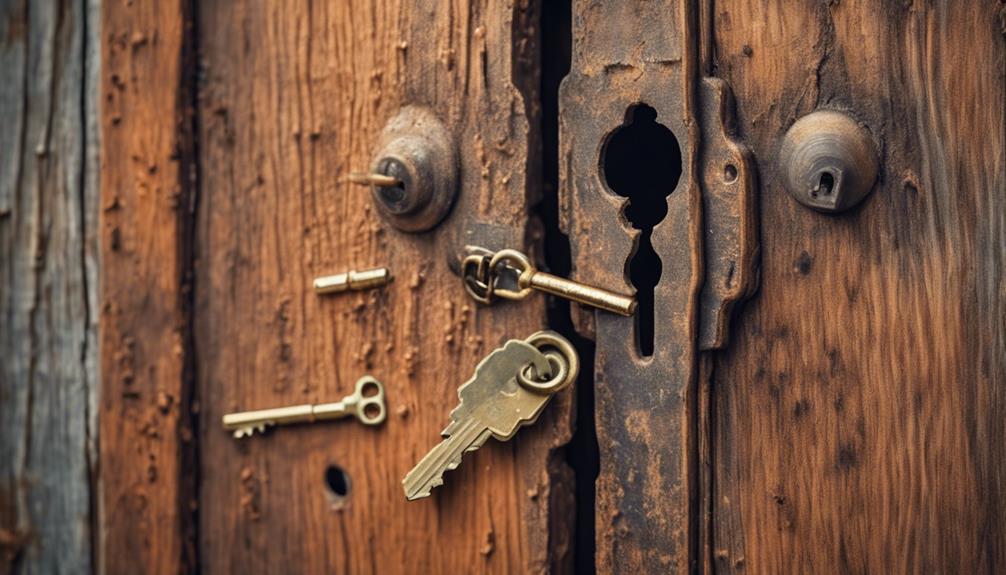
Lock failures can be a real headache, often resulting from a combination of wear and tear, lack of maintenance, and external factors such as weather conditions. When it comes to lock materials, opting for high-quality options is key. Cheap locks may save you a few bucks initially, but they can lead to issues down the road. Look for durable materials that provide solid security features. Investing in locks made from robust metals can prevent breakages and guarantee your peace of mind. Additionally, be sure to choose locks with advanced security features like anti-drill plates, which offer enhanced resistance to drilling, and pick-resistant cylinders. By selecting the right materials and security features, you can greatly reduce the chances of encountering lock failures.
Lack of Regular Maintenance
Regular maintenance is key to ensuring the longevity and functionality of your locks. By performing routine upkeep, you can prevent issues before they arise and maintain the security of your property. Neglecting maintenance can lead to unexpected failures and compromise the safety of your belongings. Remember, following essential tips can help keep your locks rust-free and functional.
Importance of Maintenance
Proper maintenance of your locks plays an essential role in ensuring their longevity and functionality. Here are some reasons why neglecting maintenance can lead to lock issues:
- Rusty Locks: Ignoring lock inspection can result in rust buildup, causing locks to jam. Regular maintenance can help prevent this rusty locks issue.
- Sticky Situation: Lack of lubrication can make locks sticky and hard to operate.
- Key Trouble: Without regular maintenance, keys can wear down faster, leading to difficulty in opening doors.
- Loose Screws: Failure to tighten loose screws can make the lock mechanism unstable and prone to malfunctions.
- Dust and Debris: Accumulated dust and debris can clog the lock, making it challenging to insert the key smoothly.
Prevention Through Upkeep
Maintaining the functionality of your locks requires consistent attention to detail and upkeep. Regular lock inspections are crucial to catch any potential issues before they escalate. Make it a habit to check for loose screws, misalignments, or signs of wear. When it comes to lubrication techniques, using a silicone-based or graphite lubricant can keep your locks operating smoothly. Apply the lubricant sparingly to avoid attracting dirt and debris that can clog the mechanism. Remember, a well-maintained lock is less likely to break unexpectedly, saving you the hassle of dealing with a jammed door or being locked out. So, grab your tools and show those locks some love to prevent future lock issues! Additionally, following essential tips for long-lasting deadbolt maintenance can further extend the lifespan of your locks Essential Tips for Long-Lasting Deadbolt Maintenance.
Weather-Related Damage
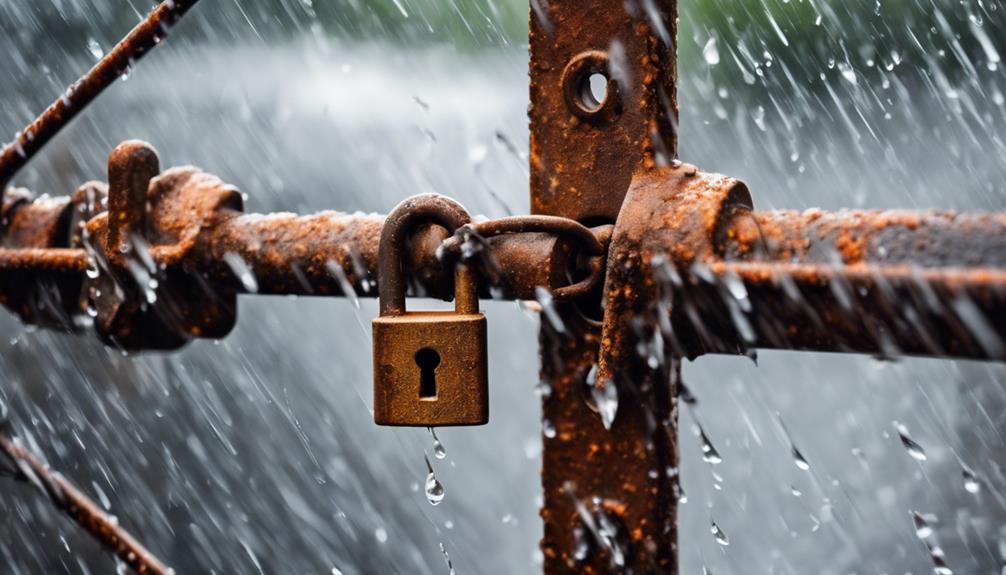
Harsh weather conditions can pose a significant threat to the integrity of your locks. When it comes to protecting your locks from weather-related damage, consider the following:
- Frozen Locks: Cold weather can cause your locks to freeze up, making it challenging to insert your key. It's important to address this issue promptly to prevent when to replace rusty locks.
- Humidity Effects: High humidity levels can lead to rust and corrosion, weakening the structure of your locks.
- Temperature Fluctuations: Rapid changes in temperature can cause metal components to expand and contract, affecting the functionality of your locks.
- UV Exposure: Prolonged exposure to sunlight can cause plastic components of your locks to degrade over time.
- Storm Damage: Severe storms can lead to water seeping into your locks, causing internal components to rust and malfunction.
Key Issues and Wear
Key issues and wear can lead to frustrating lock problems. Recognizing key wear patterns and common key problems is vital in preventing lock issues. By understanding how to properly maintain and care for your keys, you can avoid potential damage and guarantee smooth operation of your locks.
Key Wear Patterns
Regular use of keys in locks can lead to distinctive wear patterns that, over time, may result in issues such as difficulty turning the key, sticking, or even breakage. Key material and lock design play a significant role in how wear patterns develop. Here are some key wear patterns to watch out for:
- The "Wiggly Worn Down": When your key starts feeling more flexible than a yoga instructor.
- The "Teethless Wonder": When your once sharp key teeth resemble a gummy smile.
- The "Scratched and Scattered": When your key looks like it went through a cat-astrophe.
- The "Rusty Relic": When your key has been hanging out with the wrong crowd, aka moisture.
- The "Twisted Tale": When your key decides it's time to do the twist rather than opening your door.
Common Key Problems
Having a keen eye for key wear patterns can provide valuable insight into potential lock issues that may arise from common key problems. Key duplication can lead to issues if not done correctly, causing keys to not fit properly into locks due to slight variations. It's important to note that the risks of duplicating keys multiple times can impact their accuracy, potentially leading to compatibility issues. Key compatibility is essential as using the wrong key can damage the lock over time. Signs of common key problems include difficulty turning the key, the key getting stuck, or the key not fully engaging with the lock mechanism. To prevent these issues, verify keys are duplicated accurately and only use compatible keys for your locks. By being mindful of key problems, you can avoid unnecessary lock complications and keep everything running smoothly.
Preventing Key Damage
To maintain the longevity of your keys and prevent potential damage, it is essential to be mindful of key issues and wear. When it comes to key material, some are more prone to damage than others. Here are some key handling tips to keep your keys in top shape:
- Avoid using your keys as tools; they're great at opening doors, not so much at opening cans.
- Make sure to keep your keys separate from sharp objects like knives to prevent scratches and dents. It's also important to remember that keys can break due to wear and tear Preventing Key Breakage in Locks.
- Try not to overload your keychain with too many keys; it's not a game of how many can fit.
- Keep your keys away from extreme temperatures; they're not fans of hot summers or freezing winters.
- And most importantly, don't use your keys for anything other than opening doors; they have a specific life purpose!
Improper Installation
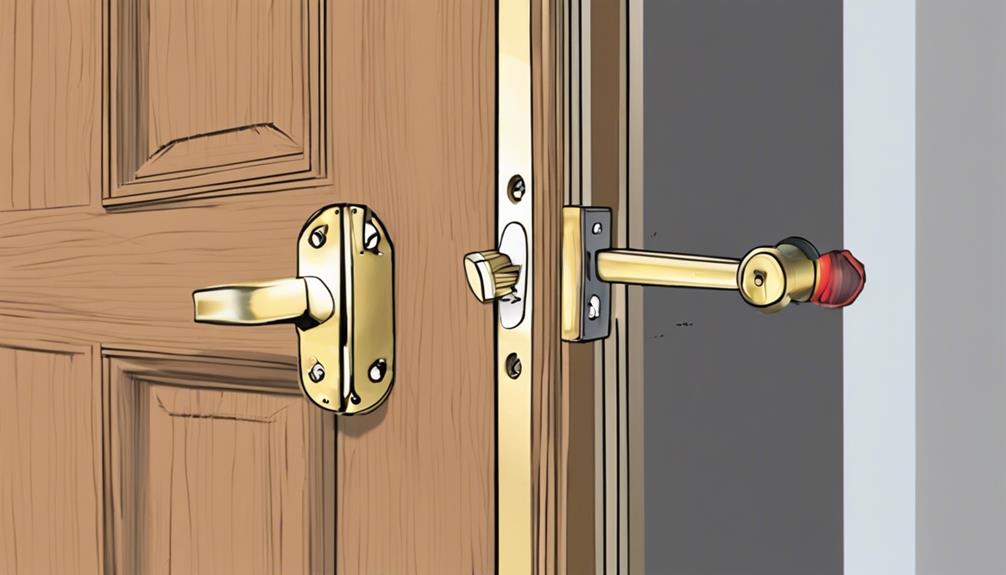
Improper installation of locks can lead to a myriad of issues, compromising the security of your property. When it comes to lock alignment and installation mistakes, even the smallest error can have big consequences. Imagine this:
| Common Installation Mistakes | Potential Consequences | Likelihood of Lock Failure |
|---|---|---|
| Misaligned Deadbolt | Easy Break-ins | High |
| Loose Screws | Jammed Locks | Medium |
| Incorrect Strike Plate | Door Warping | Low |
To prevent these calamities, make sure your locks are installed correctly. If you're not confident in your installation skills, don't be afraid to call in a professional. Remember, a secure lock is no joke!
Attempted Break-Ins
During a break-in attempt, your locks are put to the ultimate test. It's like a game of cat and mouse with burglars trying to outsmart your security measures. Here are some tips to keep them at bay:
- Upgrade Your Security: Investing in high-quality locks can deter even the most determined intruders.
- Know Your Lock Types: Different locks offer varying levels of protection, so choose wisely.
- Reinforce Weak Points: Identify vulnerable areas and strengthen them with additional security measures.
- Stay Informed: Keep up to date with the latest security trends and technologies to stay one step ahead.
- Don't DIY: Sometimes leaving it to the professionals is the best choice for peak security upgrades.
Low Rate Locksmith Prevention Services
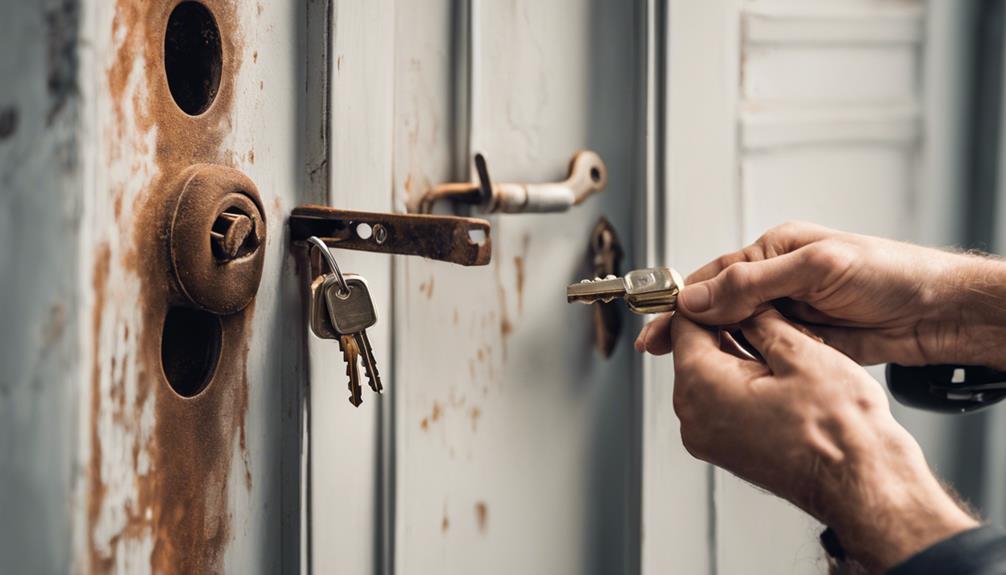
In your quest to safeguard your home from potential break-ins, engaging the expertise of Low Rate Locksmith Prevention Services can provide you with a proactive defense strategy. These locksmith service benefits go beyond just fixing locks. They offer preventative measures to keep your home secure, such as installing high-security locks, reinforcing door frames, and providing emergency locksmith solutions round the clock. With their help, you can fortify your home against unwanted intruders and ascertain that your locks are in first-rate condition. Don't wait for a break-in to happen; take the first step towards a safer home by enlisting the help of Low Rate Locksmith Prevention Services today. Remember, a stitch in time saves nine, or in this case, a lock in time saves your dime!
Conclusion
To wrap it up, by understanding the common causes of lock failures and taking proactive measures to prevent future issues, you can safeguard your property against potential security threats. Remember, just like maintaining a well-oiled machine, regular maintenance and awareness of key vulnerabilities are essential in keeping your locks secure. By staying informed and addressing any issues promptly, you can enjoy peace of mind knowing that your home or business is protected from potential break-ins.

